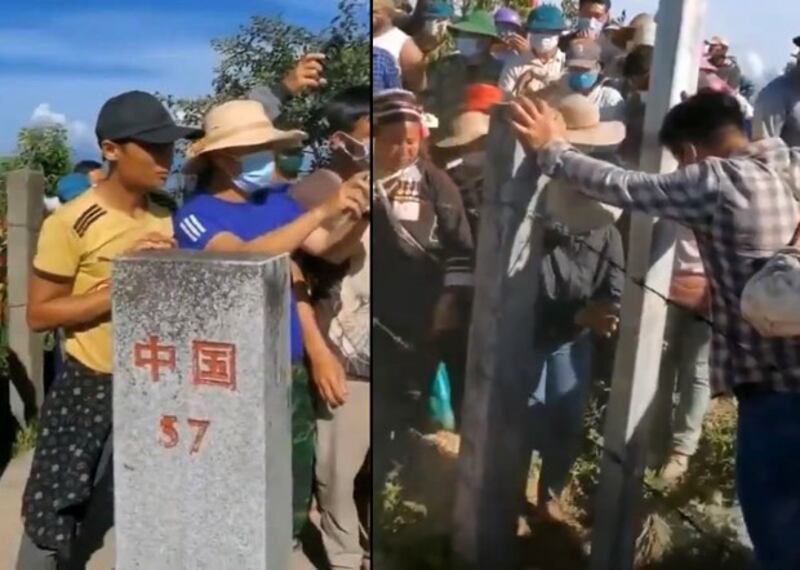Residents of a region of Vietnam that borders the southwestern Chinese region of Guangxi have cut through a barbed wire fence recently constructed by the Chinese authorities along the 1,000-km (620-mile) border, RFA has learned.
Police from Vietnam's border defense department watched and shot video as local people removed sections of the border fence near the No. 57 border marker, according to a video of the incident uploaded to Chinese social media.
As the operation continued, a man shouted at them in Mandarin from the Chinese side of the border.
"I'm telling you again, stop doing this," the man shouts. "Your actions are in violation of the regulations."
"You aren't respecting the regulations [agreed by] both of our countries," he shouts.
A scholar from Guangxi's Dongxing city who gave only the surname Wu said the ruling Chinese Communist Party (CCP) had recently built the fence along the border to stop people crossing over without passing through official checkpoints.
He said it had an electrical current passing through it.
"The barbed wire they put there could electrocute animals and definitely people," Wu told RFA on Friday. "China doesn't want its people leaving the country; it seems that there has been a lot of sneaking across the border."
"People are desperate to leave given the worsening situation recently," he said.
"The fence with Vietnam is electrified, while they have buried landmines along the border with Myanmar," he said.

Vietnam and Myanmar borders
Vietnamese Foreign Minister Bùi Thanh Sơn spoke on the phone with Lu Xinshe, CCP secretary of China's Guangxi Zhuang Autonomous Region on Sept. 14, the English-language Vietnam News reported.
Son thanked Guangxi for its gift of 800,000 doses of SinoPharm vaccine, medical equipment and supplies in support of Vietnam’s pandemic prevention and control efforts.
But he also called for increased information sharing and coordination in border areas and for "the construction of border gate infrastructure connectivity" to be accelerated, and for "upgrades" to border gates, so both sides could handle problems promptly, the paper reported, without giving specific details of the proposed upgrades.
China shares a 1,000-km (620-mile) border with Vietnam and a 2,000-km (1,240-mile) border with northern Myanmar, and has been busy building barbed-wire fences complete with monitoring systems and spotlights along both borders.
A businessman familiar with the area who gave only the surname Zhang said Vietnamese opposition stems from the dangers posed by the fence to both human lives and those of wild animals.
"They are worried that anyone who comes into contact with the fence could be electrocuted, including wild animals," Zhang said. "This has caused a lot of dissatisfaction in Vietnam, which is why they are demolishing it."
He said the fences will disrupt the communal lives of ethnic groups with members on both sides of the border.
"There are a large number of ethnic groups living on both sides of the border in Vietnam and Guangxi, and in Yunnan and Myanmar," Zhang said. "So half of their population might live in Vietnam and the other half in China."
"They are used to walking across from one country to another through the fields for business, or to visit friends and relatives," he said. "They've been doing this for many years."
"Now that [China] has built an electrified border fence, it has shut off these family visits," he said.
Tight exit controls
He said many people living in the border region can't afford to go through an official checkpoint every time they want to seem their families.
"Chinese border residents have a blue ID book, and every time they enter or leave the country, this book gets stamped, and it costs money to apply for a new book when it gets full," Zhang said.
"It wouldn't matter if it was just a card."
He said the Chinese authorities aren't keen to allow anyone to leave China across the southwestern border now, while arrivals are under tight restrictions due to the coronavirus pandemic.
RFA reported in August that China has stopped issuing new passports to its citizens and has imposed entry and exit controls on its population, citing the recent surge in the Delta variant of COVID-19, although commentators said Beijing is using the pandemic as a pretext to curb freedom of movement.
Chinese nationals living in mainland China have told RFA in recent months that the authorities have gradually stopped issuing new passports and exit visas -- a police-approved travel permit that adds another layer to a slew of hurdles Chinese nationals must clear in order to be allowed to leave.
The Chinese Entry and Exit Bureau recently confirmed publicly that the rules are in place, saying exit permits will only be issued for "essential" travel.
Some Chinese nationals living in the United States have also been stranded in China after they combined a trip home with plans to renew their soon-to-expire passports at the same time.
Translated and edited by Luisetta Mudie.

